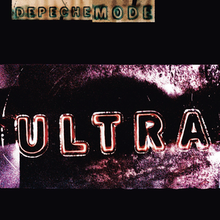| Ultra | ||||
|---|---|---|---|---|
 | ||||
| Studio album by | ||||
| Released | 14 April 1997 | |||
| Recorded | January 1996 – February 1997 | |||
| Studio |
| |||
| Genre | ||||
| Length | 60:07 | |||
| Label | Mute | |||
| Producer | Tim Simenon | |||
| Depeche Mode chronology | ||||
| ||||
| Singles from Ultra | ||||
| ||||
Ultra is the ninth studio album by English electronic music band Depeche Mode, released on 14 April 1997 by Mute Records. It was the band's first album following the departure of Alan Wilder. Wilder's departure and lead singer Dave Gahan's drug problems, which culminated in a near-fatal overdose, had caused speculation that Depeche Mode was finished.[3]
Ultra was the first album the band recorded as a trio since A Broken Frame (1982); it was also their first where the band members were not involved with production, with these duties being handled by Tim Simenon of Bomb the Bass fame. Though not directly supported by a full-length tour, it was promoted via a brief series of concerts promoted as Ultra Parties.
The album debuted at number one on the UK Albums Chart and at number five on the US Billboard 200. By April 2006, it had sold 584,000 copies in the United States.[4] In 1999, Ned Raggett ranked the album at number 50 on his list of the "Top 136 or So Albums of the Nineties".[5] That same year, the annual Ultra Music Festival in Miami was named after the album by its co-founder Russell Faibisch,[6] and acknowledging its influence on the Polish rock scene, Tylko Rock ranked it at number 71 on its list of the "100 Albums That Shook Polish Rock".[citation needed]
The album was preceded by the singles "Barrel of a Gun", released on 3 February and "It's No Good" which was released on 31 March. It was followed by the singles "Home", released on 16 June and "Useless", released on 20 October.
- ^ "40 Most Underrated Alternative Rock Albums Part 3". Smells Like Infinite Sadness. 13 November 2013. Retrieved 7 February 2022.
- ^ Yeung, Neil Z. "Depeche Mode Biography by Neil Z. Yeung". AllMusic.
- ^ "Especial Depeche Mode: Ultra" (in Spanish). Hipersonica. Archived from the original on 5 November 2012. Retrieved 5 May 2009.
- ^ Caulfield, Keith (5 April 2006). "Ask Billboard: New Depeche Order Mode". Billboard. Archived from the original on 22 September 2015. Retrieved 26 February 2014.
- ^ Breathe internet Archived 20 January 2000 at the Wayback Machine
- ^ Duran, Jose D. (14 March 2013). "How Russell Faibisch Built Ultra Music Festival – and Whom He's Battled Along the Way". Miami New Times. Retrieved 12 January 2019.